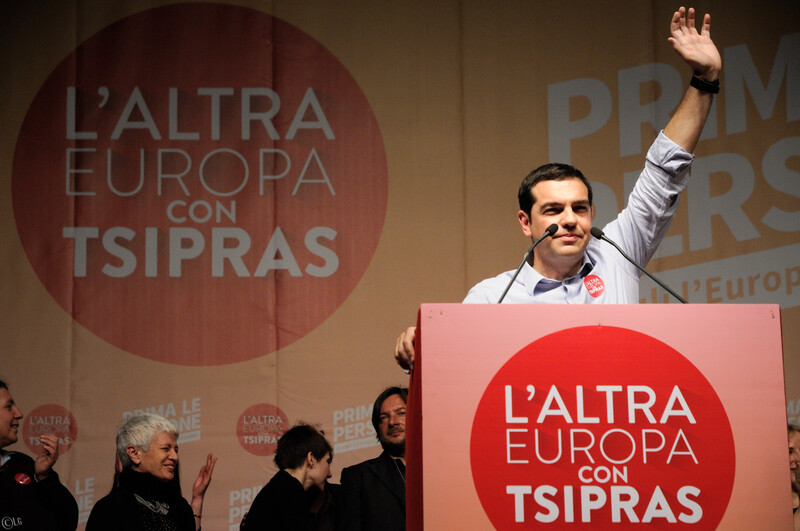Power Suits 29 January 2015

Alexis Tsipras, the new Greek prime minister. (Lorenzo Gaudenzi/Flickr)
By handing power to Syriza, the voters of Greece have stood up to the world’s bullies. Overt meddling by the European Commission — which claimed that a victory for the left would be the “wrong election result” — failed to subvert democracy.
Given the humanitarian crisis that the EU institutions and the International Monetary Fund have inflicted on Greece, it was understandable that Syriza fought its campaign on bread and butter issues. Still, I was pleased to hear that Zionists were discomforted by the party’s win. The Jerusalem Post declared it was “bad news for Israel,” citing the robust criticism of the 2014 attack on Gaza by Alexis Tsipras, the new prime minister in Athens.
In a 2012 manifesto, Syriza committed itself to ending the military cooperation between Israel and Greece. If that promise is kept, then Syriza would reverse the shameful decisions taken by the two parties that have generally held office.
Both the social democrats Pasok and the right-wing New Democracy have approved Greek participation in joint exercises with the Israeli army over recent years. Such cooperation has become so close that it was reported in 2013 that the Israeli Air Force had begun making daily flights to Greece for training purposes.
Teaming up with apartheid
This isn’t the only way that Greece has been teaming up with Israeli apartheid.
Also in 2013, Greece, Cyprus and Israel signed an agreement on exploiting energy resources in their region. It included a plan to lay an electricity cable connecting Israel to Greece.
That pipeline has been identified as a “project of common interest” by the European Commission, meaning it is eligible for EU funding.
Another project granted that status could allow the “monetization” of the vast natural gas “discoveries” in the Eastern Mediterranean, according to one EU document. Known as the Southern Gas Corridor, the project would link Israeli-controlled gas fields to mainland Greece and possibly — via interconnecting networks — to Italy and Bulgaria.
Ethics overlooked
The strategic implications of these “discoveries” (mainly by the US giant Noble Energy) are not hard to work out. Today, the Israeli economy relies to a significant degree on Europe, its top destination for exports.
That situation could change if Israel becomes a significant supplier of energy. Israeli politicians would be able to tell the EU that “you need us.”
The ethics of buying gas from an apartheid state appear not to have been discussed by the energy analysts in the Brussels bureaucracy.
Nor do they appear too bothered by the frictions which would be caused by the exploitation of these gas fields. That the size of the “discoveries” has been compared to Iraq’s energy reserves is worrying enough, considering the horrors visited on that country by Western powers addicted to fossil fuels.
More troubling again, some of these fields are in what are euphemistically known as “disputed” waters. After Lebanon asserted in 2010 that some of the Leviathan gas field is located in its waters, an Israeli minister responded with a threat to maintain Israel’s control of this key “discovery” by force.
Greece’s location at the “entry door for the Southern Gas Corridor” could make it a “regional gas hub,” the European Commission has stated.
Ensuring alternatives
There have been few reasons for Europe’s left to be cheerful lately. Syriza’s election victory is the most notable exception. But that triumph will soon turn sour if it emerges that Greece’s new government is facilitating the entry of Israeli gas into Europe.
Syriza represents an alternative to the brutal economic policies of the world’s bullies. These same bullies are wedded to a system built on the constant burning of gas, coal and oil. Although that system has caused climate change — arguably the greatest risk to the human species — the bullies remain determined to keep on burning those deadly fuels.
Ensuring a genuine alternative requires replacing austerity with large-scale public investment, especially in wind and solar power. The most obvious reward for countries, cities or provinces which undertake these investments is that they can enjoy a degree of self-sufficiency. No longer will they be dependent on imported energy.
Democracy is not limited to elections. And the attempts to destroy democracy have not been limited to Greece; the world’s bullies are seeking to introduce a nastier form of capitalism wherever they sniff an opportunity to do so.
If Syriza and other left-wing parties are to deliver on their promises, then they will require both solidarity and pressure from a broad movement. Severing ties to apartheid Israel should be one of the movement’s key demands.






Comments
SOME FACTS FOR REVIEW
Permalink THOMASWADAMS replied on
Much of the international support that Israel receives is based on several lies it tells and re-tells as "facts".
By Joseph Massad
November 07, 2011 "Al Jazeera" - --In 1991, negotiations started officially and unofficially between the Palestine Liberation Organisation (and the Palestinians associated with it) and the Israeli government. At the time, Israel had occupied the West Bank (including East Jerusalem) and the Gaza Strip for the previous 24 years.
Today, 20 years later, Israel and President Obama insist that the only way to bring about peace, and presumably end the Occupation, is to continue with negotiations. It is unclear if what Obama and Israel are claiming is that Israel needs 24 years of negotiations in order to end its 24-year occupation of Palestinian land, so that by the time the occupation ends, it will have lasted for 48 years.
This of course is the optimistic reading of the Israeli and US positions; the reality of the negotiations and what they aim to achieve, however, is far more insidious.
The negotiations have been based on specific goals to end certain aspects of the Israeli relationship to the Palestinians, namely some of the parts introduced since the 1967 war and the occupation, and the beginning of exclusive Jewish colonial settlement of these territories.But what always remains outside the purview of negotiations is the very core of the Palestinian-Israeli relationship, which the Palestinians are told cannot be part of any negotiations.
It is inconceivable to me
Permalink Tess replied on
It is inconceivable to me that Syriza would ever cooperate in any way with Israel.